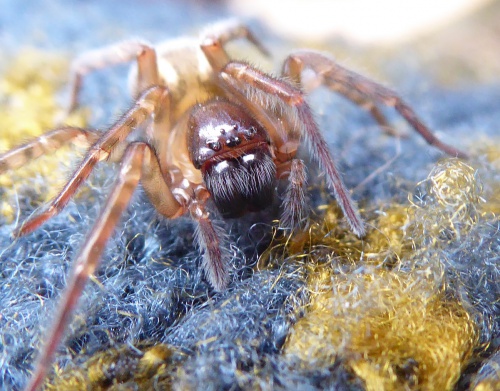Lace-weaver Spider - Amaurobius similis
Female to 12 mm; male to 8 mm. Distinctive, with a glossy brown carapace and legs and a velvety abdomen with a dark anterior wedge-shaped marking surrounded by cream. It often lives around buildings where it occupies holes in walls, fences, window frames, etc.
This species is very similar to A. fenestralis and the two cannot reliably be distinguished by eye. If in a garden or associated with houses then it is more likely to be A. similis, however if in woodland it more likely to be A. fenestralis. However, habitats overlap so this species: "Requires examination at high magnification in good lighting, typically examination of the genitalia." Bee, L., Oxford, G., & Smith, H. (2020). Britain's Spiders: A Field Guide. Second Edition. Princeton University Press.
Requires examination at high magnification in good lighting, typically examination of the genitalia.
Frequently seen around houses and gardens. These spiders produce a bluish coloured silk around the entrance to holes and crevices on just about every wall you look at.
Adult females all year; males from June to November.
Widespread and frequent in Britain
Common in Leicestershire and Rutland.
3,759 British records for this species to 2015.
Leicestershire & Rutland Map
Enter a town or village to see local records
MAP KEY:
Yellow squares = NBN records (all known data)
Coloured circles = NatureSpot records: 2025+ | 2020-2024 | pre-2020
UK Map
Species profile
- Species group:
- Spiders
- Kingdom:
- Animalia
- Order:
- Araneae
- Family:
- Amaurobiidae
- Records on NatureSpot:
- 110
- First record:
- 12/02/1994 (Jon Daws)
- Last record:
- 28/10/2025 (Poole, Adam)
Total records by month
% of records within its species group
10km squares with records
The latest images and records displayed below include those awaiting verification checks so we cannot guarantee that every identification is correct. Once accepted, the record displays a green tick.
In the Latest Records section, click on the header to sort A-Z, and again to sort Z-A. Use the header boxes to filter the list.


















